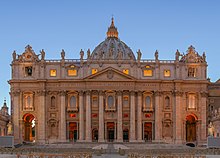Pope John Paul II's political views

Relations with dictatorships
In 1984 through "Instruction on Certain Aspects of the 'Theology of Liberation,'" and similar documents employing the voice of
John Paul II was criticised[
The pope, who began his papacy when the Soviet regime controlled his native country of Poland, as well as the rest of Central and Eastern Europe, was a critic of Communism, and supported the Polish Solidarity movement. Former Soviet President Mikhail Gorbachev once said the collapse of the Iron Curtain would have been impossible without John Paul II.[2]
In later years, after having condemned Liberation theology, John Paul II criticised some of the more extreme versions of capitalism. "Unfortunately, not everything the West proposes as a theoretical vision or as a concrete lifestyle reflects Gospel values." He saw in capitalism certain "viruses": indifferentism, hedonism, secularism, consumerism, practical materialism, and also formal atheism.
| Part of a series on the |
| Catholic Church |
|---|
 |
| Overview |
|
|
Jubilee 2000 campaign
In 2000 he publicly endorsed the
Iraq war
In 2003 John Paul II also became a prominent critic of the
Wars generally do not resolve the problems for which they are fought and therefore... prove ultimately futile.
— Pope John Paul II, [5]
European Constitutional Treaty
In European Union negotiations for a new European Constitutional Treaty in 2003 and 2004, the Vatican's representatives failed to secure any mention of Europe's "Christian heritage"—one of the Pope's cherished goals.
Sexuality
While taking a traditional position on
Scientific theories and the interpretation of Genesis
In an address on 22 October 1996, to the Pontifical Academy of Sciences, Pope John Paul II reaffirmed the Church's openness to the theory of evolution:[8][9][10][11]
In his encyclical Humani Generis (1950), my predecessor Pius XII has already affirmed that there is no conflict between evolution and the doctrine of the faith regarding man and his vocation, provided that we do not lose sight of certain fixed points....Today, more than a half-century after the appearance of that encyclical, some new findings lead us toward the recognition of evolution as more than an hypothesis. In fact it is remarkable that this theory has had progressively greater influence on the spirit of researchers, following a series of discoveries in different scholarly disciplines. The convergence in the results of these independent studies – which was neither planned nor sought – constitutes in itself a significant argument in favour of the theory.
— John Paul II, Message to the Pontifical Academy of Sciences on Evolution
In the same address, the Pope rejected any theory of evolution that provides a materialistic explanation for the human soul:
Theories of evolution which, because of the philosophies which inspire them, regard the spirit either as emerging from the forces of
living matter, or as a simple epiphenomenon of that matter, are incompatible with the truth about man— John Paul II, Message to Pontifical Academy of Sciences, 22 October 1996
John Paul II also wrote to the Pontifical Academy of Sciences on the subject of cosmology and how to interpret Genesis:
Pontifical Academy of Science, "Cosmology and Fundamental Physics"
References
- Notes
- ^ Rother, Larry (3 April 1987). "Pinochet foes cheered by the pope's presence". New York Times. p. 3.
- ^ "Gorbachev: Pope was 'example to all of us'". CNN. 4 April 2005. Retrieved 11 January 2009.
- ^ Contact Music (2010). "U2 – Eno Lets Bono Speak To The Pope – Contactmusic News". contactmusic.com. Retrieved 22 December 2011.
- ^ John Paul II, "Address to the Diplomatic Corps," Vatican, 13 January 2003 (accessed 7 February 2007).
- ^ Pope John Paul II. "Message of His Holiness Pope John Paul II for the celebration of the World Day of Peace". Retrieved 21 May 2018.
- ^ "Gay marriage part of 'ideology of evil,' pope says". Retrieved 22 March 2023.
- ^ "John Paul II: A strong moral vision". BBC.
- ^ "Message to Pontifical Academy of Sciences October 22, 1996". Catholic Information Network. 24 October 1997. Retrieved 15 February 2009.
- ^ Linder, Doug (13 April 2004). "The Vatican's View of Evolution: The Story of Two Popes". University Missouri-Kansas City School of Law. Archived from the original on 21 February 2009. Retrieved 15 February 2009.
- ^ "Magisterium Is Concerned with Question of Evolution For It Involves Conception of Man". National Center for Science Education. 24 October 1996. Retrieved 12 November 2009.
- ^ Tagliabue, John (25 October 1996). "Pope Bolsters Church Support for Evolution". The New York Times. Retrieved 15 February 2009.
